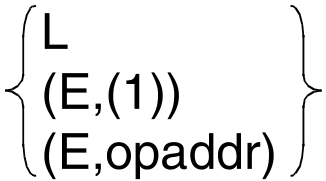CLSCALL closes the program context opened with OPNCALL. The specified context identifier is then no longer valid.
Operation | Operands |
CLSCALL | CALLID = addr / reg [ ,MF = |
CALLID = addr / (reg)
The address of a 4-byte field or the register which contains the context identifier.
MF=
defines special requirements for macro expansion (see the manual “Executive Macros” [8 (Related publications)]
for details).
L
Only the data part of the macro expansion (operand list) is generated. This requires that no operand types with executable code appear in the macro. The data part generated has the address specified in the name field of the macro.
(E,(1)) / (E,opaddr)
Only the instruction part of the macro expansion is generated. The associated data part (operand list) is referenced by the address “opaddr”. This is either in register 1 or is specified directly.
Register usage
Register 1: address of the parameter list
Return information and error flags
Register 15 contains a return code in the right-most byte:
X’00’ X’08’ X’40’ | normal execution call ID does not exist call ID in incorrect environment |

